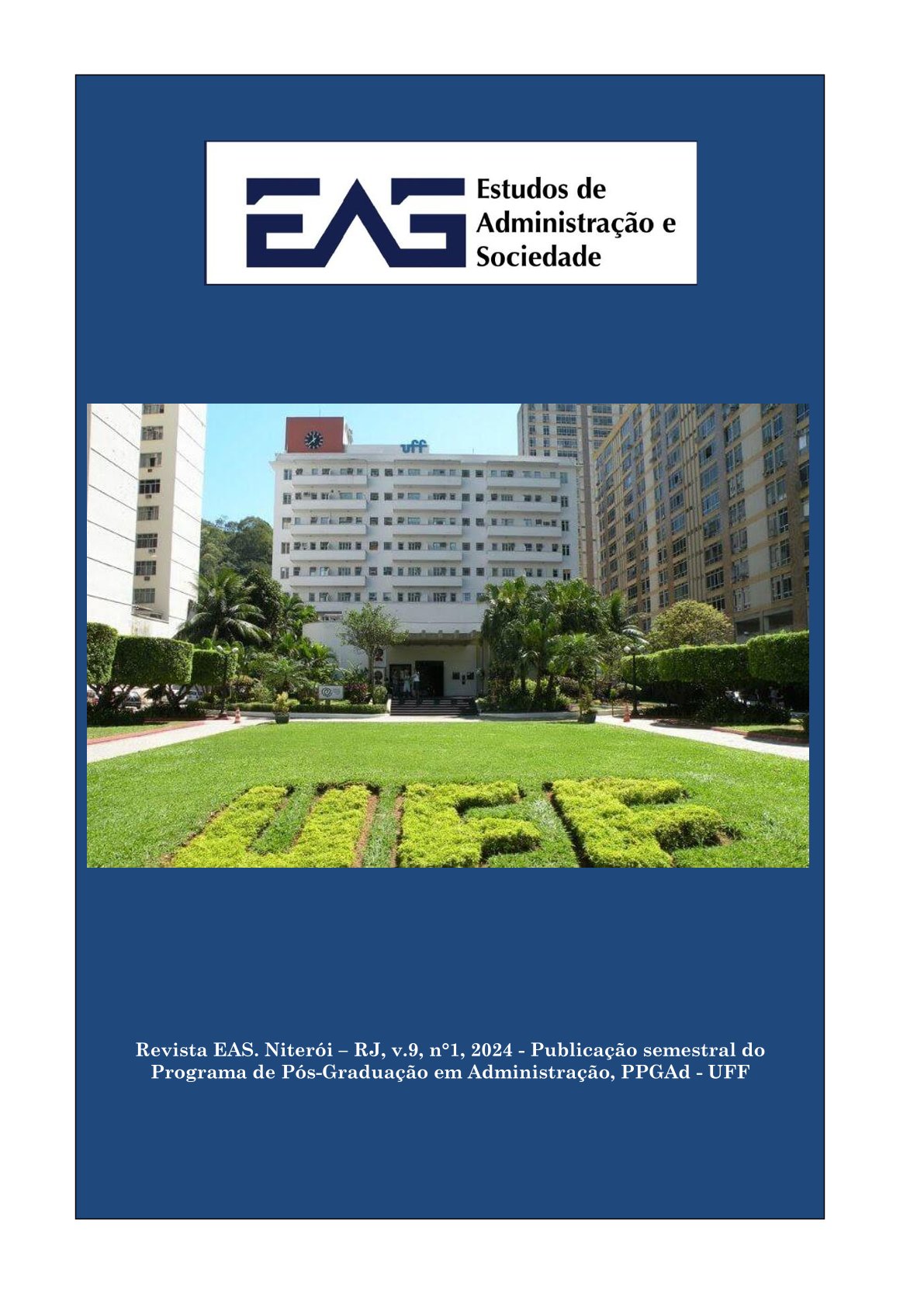Participação nas Teorias Organizacionais – Breve revisão do tema
DOI:
https://doi.org/10.22409/eas.v9i1.60066Abstract
Participation in Organizational Theories – Brief review if the topic
This work aims to carry out a brief review of some of the main theoretical concepts on the topic of Participation in the trajectory of Organizational Theories. It thus intends to present the approach of each of its schools on the subject, using as a time frame, mainly, the propositions elaborated in the period that goes from the end of the 19th century to the 20th century, where their philosophical, ideological and political conceptions were consolidated and ended up influencing its implementation in the space of organizations and society. Some facts had a direct influence on the topic, for example, the outbreak of the First and Second World Wars, the Russian Revolution, the period of the so-called Cold War, and the end of the Soviet experience until the fall of the Berlin Wall, among others. . Monitoring how production on the topic takes place within organizational theories: their theoretical, philosophical, ideological and political basis will allow us to understand how they were influenced by the situation of this period, where they sought to reconcile issues related to the theme of Participation, with its inherent antagonisms and contradictions. process, often irreconcilable. The final result, achieved through the presentation of the main approaches, some of its main authors and a critical evaluation on the topic of Participation in Organizational Theories, allowed a brief assessment of the level of advancement that its propositions effectively allow within the scope of organizations.
Keywords: Participation – Organizational Theories – Critical evaluation
Downloads
References
Barnard, C. (1971). As funções do Executivo. SP: Ed. Atlas.
Bennis, W. C. (1972). Desenvolvimento Organizacional: sua Natureza, Origens e Perspectivas. SP: Edgard Blücher.
Bertalanffy, L. V. (1976) Teoria Geral dos Sistemas. Petrópolis: Vozes.
Bordenave, J. E. D. (1983) O que é Participação, SP, Brasiliense.
Braverman, H. (1981). Trabalho e Capital Monopolista: a Degradação do Trabalho no Século XX. Rio de Janeiro: Zahar Editores.
Brow, J.A.C. (1967). Psicologia Social da Indústria. SP: Editora Atlas.
Campos, E. (1976). Sociologia da Burocracia. RJ: Zahar Ed.
Chiavenato, I. (1993). Introdução à Teoria Geral da Administração, SP: Makron Books.
Cunha, E. P. (2018). Ontogênese e Formas particulares da Função de Direção: Introdução aos Fundamentos Históricos para a Crítica Marxista da Administração. In: E. P. Cunha [et al.], D. L. Ferraz (organizadores), Crítica Marxista da Administração, Rio de Janeiro: Rizoma.
Etzioni, A. (1973) Organizações Complexas: um estudo das organizações em face dos problemas sociais. SP: Editora Atlas.
Etzioni, A. (1980). Organizações Modernas. SP: Pioneira.
Fayol, H. (1981). Administração Industrial e Geral, SP, Atlas.
Guerreiro Ramos. A. (1983). Administração e contexto brasileiro. RJ: Ed. da FGV.
Graham, P. (org.) (1977), Mary Parker Follet – Profeta do Gerenciamento, Rio, Qualitymark.
Herzberg, F.(1966). Work and the Nature of Man. Cleveland, Ohio: The World Publishing Co.
Hofstede, G. (1980). Motivation,Leardership and Structure: do american theories apply abroad?. Org. Dynamics: Summer.
Katz, D. e Kahn, R. L (1973). Psicologia Social das Organizações. SP: Atlas, Brasília, INL.
Lawrence, P. R. e Lorsch, J. W. (1972). O Desenvolvimento de Organizações: diagnóstico e ação, SP: Edgard Blücher.
Likert, R. (1975) A Organização Humana. SP: Atlas.
March, J.G. e Simon, H.A. (1967) Teoria das Organizações. Rio de Janeiro: FGV, Serviço de Publicações.
Maslow, A. (1954). Motivation and Personality. N.Y.: Harper e Row Publishers.
Mayo, E. (1945). The Social Problems of an Industrial Civilization. Cambridge, Mass, Harvard University Press.
Mcgregor, D. (1980). O Lado Humano da Empresa. SP: Martins Fontes.
Mendonça, L.C. (1987) Participação na organização: Uma introdução aos seus fundamentos, conceitos e formas, SP, Atlas.
Merton, R. K. (1973). Estrutura burocrática e personalidade. In: A. Etzioni. Organizações Complexas. SP: Atlas, (pp. 57-69).
Motta, P.R. (1981).. Participação na Gerência: uma perspectiva comparada. Revista de Administração Pública, FGV, vol. 15, no. 4, out/dez.
Prestes Motta, F.C. (1986). Teoria das organizações: Evolução e Crítica. SP, Pioneira.
Roethlisberger, F. J. e Dickson, W. J.(1971). A organização e o trabalhador. SP: Atlas.
Schein, E.H. (1982). Psicologia Organizacional. RJ: Ed. Prentice-Hall do Brasil.
Selznick, P. (1973). Fundamentos da teoria de organização. In: A. Etzioni Organizações Complexas. SP: Ed. Atlas, (pp.30-43).
Simon, H A. (1965). O Comportamento Administrativo. Rio de Janeiro: Fundação Getúlio Vargas.
Taylor, F. W. (1970). Princípios de Administração Científica. SP, Atlas.
Tragtenberg, M. (1989). Administração, Poder e Ideologia. SP: Cortez.
Weber, M. (1967). A Ética Protestante e o Espirito do Capitalismo: SP: Livraria Pioneira Editora.
Weber, M. (1971). Ensaios de Sociologia. RJ, Zahar.
Weber, M. (1973). Os Três aspectos da Autoridade Legitima. In: A. Etzione. Organizações Complexas. SP: Ed. Atlas, (pp.17-26).
Weber, M. (1976) Os Fundamentos da Organização Burocrática. In: E. Campos. Sociologia da Burocracia, RJ: Zahar Ed.
Wiener, N. (1968). Cibernética e Sociedade: o uso humano de seres humanos. SP: Editora Cultrix.
Downloads
Published
Issue
Section
License
Copyright (c) 2024 Journal of Management Studies and Society

This work is licensed under a Creative Commons Attribution 4.0 International License.
Autores que publicam nesta revista concordam com os seguintes termos:
- Autores mantém os direitos autorais e concedem à revista o direito de primeira publicação, com o trabalho simultaneamente licenciado sob a Licença Creative Commons Attribution que permite o compartilhamento do trabalho com reconhecimento da autoria e publicação inicial nesta revista.
- Autores têm autorização para assumir contratos adicionais separadamente, para distribuição não-exclusiva da versão do trabalho publicada nesta revista (ex.: publicar em repositório institucional ou como capítulo de livro), com reconhecimento de autoria e publicação inicial nesta revista.
- Autores têm permissão e são estimulados a publicar e distribuir seu trabalho online (ex.: em repositórios institucionais ou na sua página pessoal) a qualquer ponto antes ou durante o processo editorial, já que isso pode gerar alterações produtivas, bem como aumentar o impacto e a citação do trabalho publicado (Veja O Efeito do Acesso Livre).

